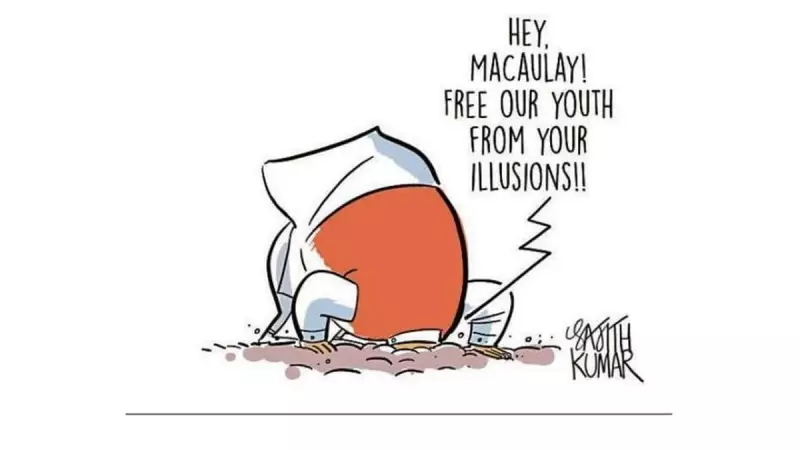
A recent political cartoon has sparked significant discussion about the enduring influence of colonial-era education policies on contemporary Indian youth. The thought-provoking illustration directly confronts the legacy of Lord Thomas Babington Macaulay, whose 19th-century education system continues to shape India's academic landscape nearly two centuries later.
The Colonial Ghost in Modern Education
The cartoon powerfully visualizes how Macaulay's educational framework, established during British rule, still exerts considerable influence over young Indian minds today. Lord Macaulay, who served on the Supreme Council of India between 1834 and 1838, introduced an English-language based education system that aimed to create a class of Indians who were Indian in blood and color, but English in taste, opinions, morals, and intellect.
This colonial education model prioritized Western knowledge systems over indigenous learning methods, effectively creating a cultural and intellectual dependency that many argue persists in today's educational institutions. The cartoon suggests that contemporary Indian youth remain trapped within this colonial mindset, unable to fully embrace their cultural heritage while navigating global expectations.
Contemporary Relevance and Public Response
The timing of this cartoon coincides with ongoing national debates about educational reform and decolonization of curriculum. Many educators and social commentators have praised the artwork for highlighting how colonial-era thinking continues to limit the creative and intellectual potential of Indian students even in the 21st century.
Social media platforms have seen vigorous discussions about the cartoon's message, with many users sharing personal experiences of how the Macaulay system affected their educational journey. The visual commentary has resonated particularly with younger Indians who feel caught between traditional expectations and modern global demands.
Education experts note that while the National Education Policy 2020 represents a significant step toward indigenizing education, the psychological impact of Macaulay's system requires deeper addressing. The cartoon serves as a stark reminder that policy changes alone cannot undo generations of colonial conditioning.
Path Forward: Reclaiming Educational Identity
The conversation sparked by this political cartoon extends beyond mere criticism to constructive solutions. Many respondents have suggested that true educational reform must include greater integration of Indian knowledge systems, languages, and cultural perspectives at all academic levels.
Several educational institutions have begun implementing changes that balance global standards with local context, but experts agree that systemic transformation requires sustained effort. The cartoon's underlying message emphasizes the urgent need for Indian youth to break free from colonial mental frameworks and develop educational approaches that celebrate indigenous wisdom while embracing global opportunities.
As India continues to assert itself on the world stage, questions about educational identity and cultural autonomy remain crucial. This political cartoon serves as both a critique and a catalyst for meaningful dialogue about creating an education system that truly serves the aspirations of contemporary Indian youth without colonial baggage.





